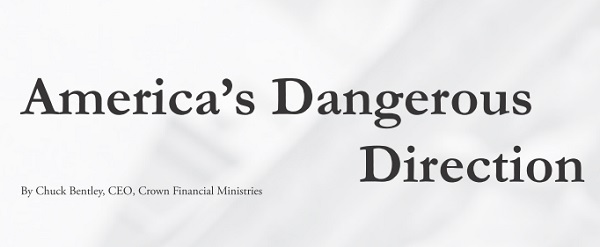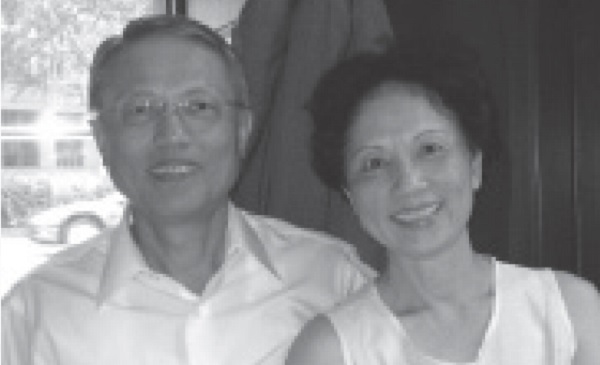America’s Dangerous Direction
By Chuck Bentley, CEO, Crown Financial Ministries

This economic scholar, and committed Christian, ties America’s financial crisis to the failure of meeting the conditions set forth for Israel (or any God-honoring nation) in Chapter 28 of Deuteronomy—conditions that require obeying God.
“If you fully obey the Lord your God and carefully follow all his commands I give you today, the Lord your God will set you high above all the nations on earth. All these blessings will come upon you and accompany you if you obey the Lord your God” (Deuteronomy 28:1-2 NIV, emphasis mine).
What are the economic rewards for the nation that obeys the Lord?
“You will lend to many nations but will borrow from none. The LORD will make you the head, not the tail” (vss. 12-13).
Notice the economic consequences are inverted to those nations that disobey the Lord’s commands:
“The alien [foreigner] who lives among you will rise above you higher and higher, but you will sink lower and lower. He will lend to you, but you will not lend to him. He will be the head, but you will be the tail” (vss. 43-44).
In view of these conditional promises of God, Dr. Wen comments, “Observed from the statistics, the United States up to the 1970s was the world’s largest net creditor country.” In other words, we were lending to many nations out of our incredible abundance, blessed by God. However, “in 1985, the United States had turned into a net debtor nation, and by 2004 the U.S. became the largest debtor nation in the world.”
The dangerous path we are on is a result of our disobedience to the Lord. Even more dangerous is the “solution” for economic recovery—more federal debt borrowed from foreign nations. Dr. Wen says that while increased federal debt to stimulate the economy is helpful in the short term, in the long term it is “like quenching thirst with poison.”
In addition to his concerns with the excessive debt and overspending by the U.S. government, Dr. Wen notes how individual Americans are in a similar situation. The average American family has high debt and low savings. Fourteen percent of after-tax income is consumed for debt service alone, and the savings rate is less than 5 percent of gross annual income.
What Should Christians Do?
The noted scholar gives this straightforward advice:
1. We should pray to God for the United States and Europe—nations who have historically enjoyed God’s economic blessing—that they would return to God and not continue moving away from Him. We should ask the Lord to grant mercy and a spirit of repentance to reject sin and degeneration and to embrace God’s Word once more.
2. We should use our influence and exercise our civic responsibilities to elect leaders who will rein in government overspending and the sustained accumulation of debt.
3. As individuals, we should return to the teachings of the Bible. Because we belong to God, our resources also belong to Him—we are stewards, not owners.
4. We must remain faithful and obedient stewards of God. In practice, we should increase savings and work to retire every debt, including home mortgages.
And finally, we need to live a contented life, free from the love of money (see Hebrews 13:5).
It is a great privilege for me to announce that both Dr. Wen and his wife, Kweiyin, have joined our staff as volunteers. They will continue to reside in Washington, D.C., and serve as Crown’s U.S. Directors for Chinese Outreach. In addition, Dr. Wen will serve on the Board of Economic Advisors we are establishing. I thank God that He has sent us such capable servants for such a time as this.
Dr. Wen holds a Ph.D. in Political Economy from Johns Hopkins University as well as the designations of Chartered Financial Analyst (CFA) in the U.S. and Securities Analyst in Taiwan. He retired from the World Bank as a senior economist after over 20 years of service and returned to Taiwan to teach at National Dong Hwa University in 1996, where he had served as Director of the Graduate Institute of Mainland China Affairs, Chairman of the Department of Economics, and Director of Graduate Institute of International Economics.
In January 2005, he was appointed by Taiwan’s government to serve a five-year term as a Board Director of the Central Bank of Republic of China (Taiwan), which now has foreign reserves of $370 billion, and is one of the largest “creditors” of the U.S. national debt. Currently he is an Honorary Professor at the National Dong Hwa University.

Dr. Wen and Kweiyin.
Reproduced from: Money Matters, September-October 2010, pages 4-5, 18, Crown Financial Ministries, Gainesville, GA. Reprint permission was granted by Crown Financial Ministries.


 Following in the footsteps of Crown’s cofounders, the late Larry Burkett and the immediate past CEO, Howard Dayton, Chuck has assumed the CEO mantle of a strategic organization, founded in 1976. It now reaches around the world with staff on every continent, a media presence throughout North and South America, and books and materials serving the spiritual and financial needs of all people.
Following in the footsteps of Crown’s cofounders, the late Larry Burkett and the immediate past CEO, Howard Dayton, Chuck has assumed the CEO mantle of a strategic organization, founded in 1976. It now reaches around the world with staff on every continent, a media presence throughout North and South America, and books and materials serving the spiritual and financial needs of all people.